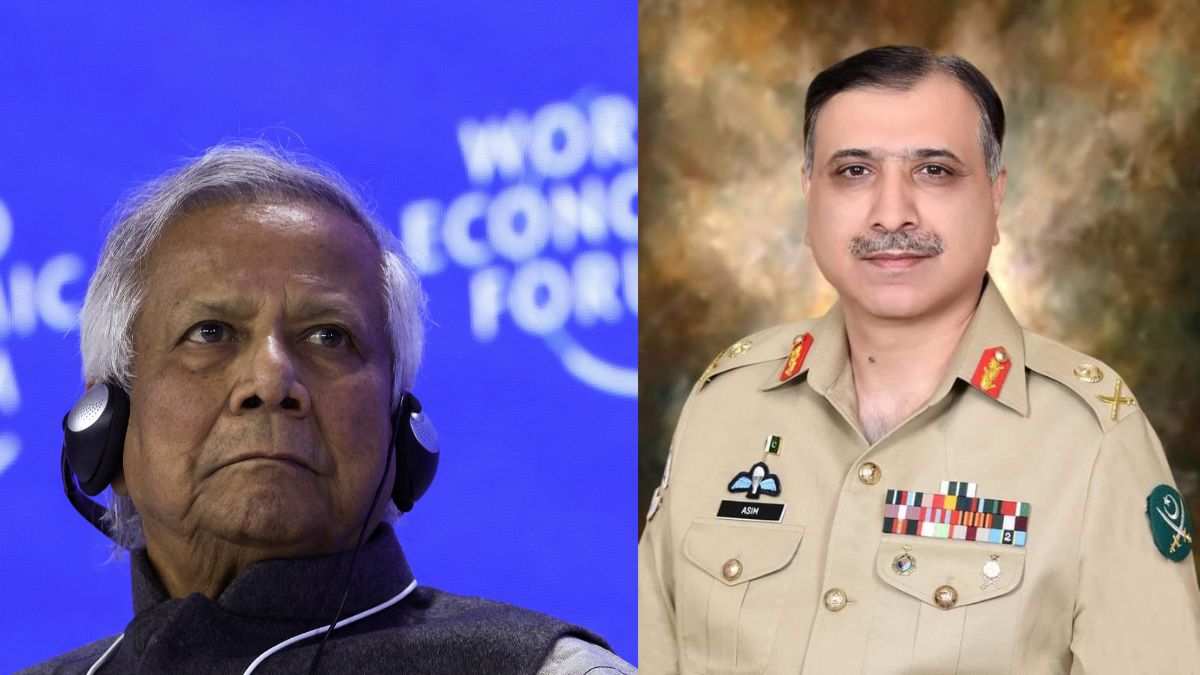For the first time in decades, the head of Pakistan’s intelligence agency, the Inter-Services Intelligence (ISI), is visiting Bangladesh with ISI chief Lt Gen Asim Malik arriving in Dhaka via Dubai earlier this week, where he was received by Lt Gen Muhammad Faizur Rahman, Quarter Master General (QMG) of the Bangladesh Army, a report by The Economic Times has revealed.
According to reports, Rahman is believed to have close ties with Islamists and Pakistan, raising eyebrows about the implications of this renewed engagement.
This high-profile visit is reportedly part of efforts to build an intelligence-sharing network between the two countries. Observers fear this could lead to subversive activities targeting India, particularly through cross-border disturbances.
The trip follows a series of interactions between Bangladeshi and Pakistani officials, indicating a warming relationship after years of hostility.
Malik’s visit also coincides with the broader geopolitical shifts in South Asia, where countries are recalibrating their foreign policies in response to changing regional dynamics.
How have ties between Dhaka and Islamabad thawed?
Bangladesh and Pakistan, historically estranged since the 1971 independence war, have recently taken steps to mend their relationship. The political landscape in Bangladesh shifted dramatically last year when Sheikh Hasina, a long-time ally of India, was ousted from power amid mass protests.
Since then, interim leader Muhammad Yunus has overseen a rapprochement with Pakistan, highlighted by meetings between Yunus and Pakistani Prime Minister Shehbaz Sharif at international summits.
These developments have paved the way for significant policy changes. For instance, Bangladesh’s interim government has eased restrictions on trade with Pakistan, including removing the requirement for physical inspections of cargo.
The establishment of direct sea links between the two nations — severed since 1971 — marks a historic thawing of relations. Furthermore, Bangladesh is set to deepen its military collaboration with Pakistan.
Beginning in February 2025, Pakistani military officials will provide training to the Bangladesh Army, and Dhaka will participate in the “Aman 2025” joint naval exercises in Karachi. This growing military cooperation underscores a shift in regional alliances that could have far-reaching implications.
Should India be worried?
India is closely monitoring these developments, which have significant implications for regional security. The renewed Bangladesh-Pakistan relationship is seen as a potential threat to India’s northeastern states, especially in light of concerns about cross-border infiltration and militant activities.
The Siliguri Corridor, a narrow strip of land connecting India’s northeastern states to the rest of the country, is particularly vulnerable. Experts warn that these evolving ties could be part of a larger strategy to destabilise India.
“There is no doubt that relations between Bangladesh and Pakistan have improved overall. This shift has security implications for India’s northeastern states,” Shanthie Mariet D’Souza, founder of the Mantraya Institute of Strategic Studies, told DW in December.
New Delhi has responded by ramping up security along its border with Bangladesh, deploying advanced surveillance technology, and conducting high-level inspections by the Border Security Force (BSF) to curb infiltration and smuggling activities.
Additionally, fears persist that China could exploit these developments to extend its influence in the region, particularly near the Siliguri Corridor. India’s northeastern states, including Assam, Meghalaya, and Tripura, have historically been prone to unrest and insurgencies, making the area a focal point of concern for Indian authorities.
The evolving situation also raises questions about Dhaka’s broader strategic goals. While improved ties with Pakistan could be seen as a response to India’s growing regional dominance, some analysts argue that Bangladesh may be leveraging this rapprochement to create a more balanced foreign policy.
However, this approach carries risks, as it could strain Dhaka’s traditionally strong ties with New Delhi.
What next for the Pakistan-India-Bangladesh triangle?
The visit of Pakistan’s ISI chief to Dhaka underscores a significant geopolitical shift in South Asia. While the full agenda of Malik’s visit remains undisclosed, experts speculate that discussions likely centered on intelligence cooperation and regional security dynamics.
Given the historical animosities and current political shifts, India faces a complex challenge in safeguarding its strategic interests while navigating the evolving power equations in its neighbourhood.
The growing ties between Bangladesh and Pakistan also come at a time when India’s northeastern states are grappling with issues such as human trafficking, insurgencies, and smuggling.
These concerns are further compounded by fears that external powers, including China, could exploit the situation to gain a foothold in the region.
“The important questions to consider are whether these strengthening ties are simply a reaction to India’s tactical pressure, or if they are part of a larger design to destabilise India. If we assume the latter is true, can the present regime in Dhaka afford to pursue such a policy? The answer is no,” said D’Souza.
Observers believe that the coming months will be crucial in determining the trajectory of Bangladesh-Pakistan relations and their impact on India.
Also Watch:
With inputs from agencies


)

)
)
)
)
)
)
)
)



